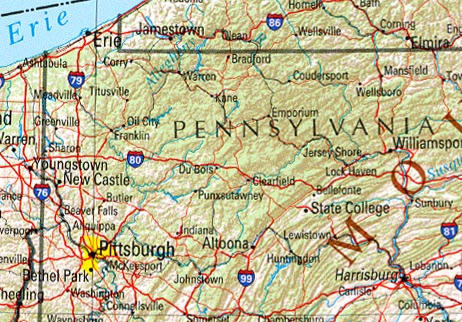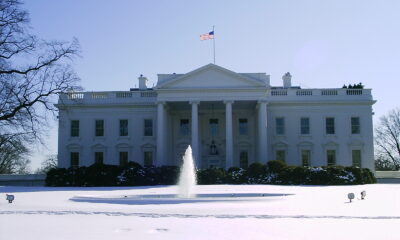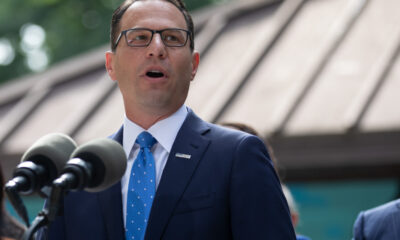Civilization
Pennsylvania Politicians’ Long History of Insignificance
Pennsylvania has been a second-class State for decades, arguably since the eclipse of Philadelphia by New York City.

The things that truly last when men and things have passed,
They are all in Pennsylvania this morning! Rudyard Kipling, “Philadelphia”
Pennsylvania didn’t see its governor nominated for Vice-President
Pennsylvania Gov. Josh Shapiro’s being passed over as Kamala Harris’s running mate reflects the low esteem that the state’s political figures are held nationally. Since the nation’s founding, Pennsylvania, once the second-largest state in the union (and home to Philadelphia, then the second-largest city) has counted for little politically.
Over the years, the country’s political parties, from the Jeffersonians and Federalists to today’s Republicans and Democrats, made few attempts to enlist the city and state’s elites into the heart of national politics. Pennsylvania’s only president, James Buchanan, is regarded as among the worst. His inaction during the national crisis over slavery is often credited with helping bring about the Civil War. Since Buchanan, no Pennsylvanian has been a serious candidate for president or vice president of either major party.
Electoral Vote
The record of the state’s governors and senators is equally unimpressive as far as national prominence is concerned. This despite the fact that for most of the 20th century, Pennsylvania’s electoral vote was second only to New York’s. It was the solidest of Republican bulwarks, voting for the Grand Old Party in every presidential election from 1900 to 1932, except for 1912, when it went for Teddy Roosevelt in his Bull Moose third-party campaign. Franklin Roosevelt held the state for his last three terms, but it reverted to Republicans in 1948 and remained so until John F. Kennedy, building upon a huge majority in Democratic-dominated Philadelphia, carried the state in 1960. In the last eight presidential elections, Pennsylvania voted Republican only once – for Donald Trump, narrowly, in 2016.
Decline of national significance
Over the past century and a quarter, only one resident of the Keystone State achieved national significance: Boies Penrose, senator from 1896 to 1921, a 300-pound mammoth of a man whose appetite was legendary. A typical breakfast would consist of a dozen eggs, a half dozen rolls, and an inch-thick slab of ham washed down in a vat of coffee. His appetite for politics was equally huge. He effectively ran Pennsylvania politics along with Republican Party boss Matt Quay and was a major figure nationally for thirty years. He helped engineer the vice presidency for Theodore Roosevelt in 1900, mostly as a way to spite the Republican Party boss, Mark Hanna, whom he disliked. He also was one of the men responsible for Warren Harding’s winning the presidency in 1920. No other Pennsylvanian since could boast of similar influence.
A case could be made that David Lawrence, long-time Democratic mayor of Pittsburgh, governor of the state from 1959 to 1963, and a respected voice in the Democratic Party, helped Kennedy become president. But he was a minor figure compared with Penrose. Hugh Scott, a long-time Republican member of the House and the Senate, was one of the three Republican elders who told Richard Nixon that he had to resign the presidency. But like Lawrence, Scott was a behind-the-scenes operator with no national ambitions.
Why has Pennsylvania declined?
The question remains: Why has Pennsylvania counted so little nationally? Some historians have argued that Pennsylvania and Philadelphia suffered from an inferiority complex once the state lost influence to New York early in the nineteenth century. The nation’s banking center moved from Philadelphia to New York in the 1830s, when Andrew Jackson declared war against the Bank of the United States then housed in the city. Financial dominance has remained on Wall Street ever since.
The same holds true for Philadelphia’s legal position. The term “Philadelphia lawyer” was once a synonym for honesty and probity, and the University of Pennsylvania was once famous for the quality of its graduates. Now Yale and Harvard have long outstripped Penn. The last graduate from Penn’s law school to serve on the Supreme Court was Owen J. Roberts. Famous for casting the vote that may have saved the Court from President Roosevelt’s packing plan – “the switch in time that saved nine” – Roberts left the Court in 1950. Yale and Harvard have dominated the Court since.
In sports and economic power
Philadelphia also lost out to New York in sports. For thirty years early in the twentieth century, Philadelphia matched New York for dominance in the only sport that then mattered to the nation, baseball. Christened “White Elephants” by New York Giants manager John McGraw, Connie Mack’s Athletics won two more World Series than McGraw’s Giants. But the success of Babe Ruth, Joe DiMaggio, and Mickey Mantle of the New York Yankees, combined with the miserable performance of the two Philadelphia teams, the A’s and Phillies, further reinforced the state and city’s sense of inferiority.
Pennsylvania’s major contributions to the nation’s economic development, the coal mining industry and Pittsburgh’s steel mills and the railroads, gave the state a powerful economic position into the twentieth century, but they failed to translate to political power. The Pennsylvania Manufacturers Association carefully nurtured the state economically and politically but lacked any interest in national politics. The Pennsylvania Railroad lost power and influence as the New York Central and the Erie Canal gave the Empire State access to the economically expanding Middle West and Great Lakes region.
Irrelevance will continue
One of the most intriguing explanations for both the state and its largest city’s sense of inferiority was developed by historian R. Digby Baltzell of the University of Pennsylvania. Baltzell, an historian as well as sociologist – he coined the term WASP – in a series of books and articles, especially “Puritan Boston and Quaker Philadelphia,” argued that Quaker influence, with its emphasis on equality and deference, was at the core of the state’s reluctance to push itself forward. Baltzell contrasted the Boston region’s record of statesmanship, from John and John Quincy Adams to the Kennedys, with the quiet deference of the great Philadelphia families, the Drexels, the Ingersolls, and the Biddles.
Considering Gov. Shapiro’s rejection for the vice presidency and the relative insignificance of the state’s two current senators, Robert Casey and John Fetterman – one a quiet party regular and the other a party renegade – I doubt if the state’s national political irrelevance will change soon.
This article was originally published by RealClearPennsylvania and made available via RealClearWire.
John P. Rossi is Emeritus Professor of History at La Salle University.
-

 Civilization1 day ago
Civilization1 day agoWhy Europe Shouldn’t Be Upset at Trump’s Venezuelan Actions
-

 Accountability4 days ago
Accountability4 days agoWaste of the Day: Principal Bought Lobster with School Funds
-

 Executive2 days ago
Executive2 days agoHow Relaxed COVID-Era Rules Fueled Minnesota’s Biggest Scam
-

 Constitution3 days ago
Constitution3 days agoTrump, Canada, and the Constitutional Problem Beneath the Bridge
-

 Christianity Today1 day ago
Christianity Today1 day agoSurprising Revival: Gen Z Men & Highly Educated Lead Return to Religion
-

 Civilization2 days ago
Civilization2 days agoThe End of Purple States and Competitive Districts
-

 Executive2 days ago
Executive2 days agoWaste of the Day: Can You Hear Me Now?
-

 Executive3 days ago
Executive3 days agoWaste of the Day: States Spent Welfare in “Crazy Ways”










